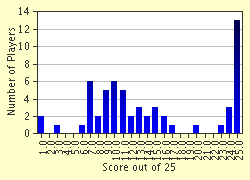Quiz Answer Key and Fun Facts
1. The Author: Sun Tsu was a general in what kingdom?
2. The Author: There is a famous story where Sun Tsu executed which members of the King's household?
3. The Author: Did Sun Tsu believe that a general should always follow the King's commands?
4. The Author: What was the first foreign kingdom that Sun Tsu defeated?
5. The Book: When was "The Art of War" first translated into English?
6. The Book: How many chapters does this book have?
7. The Book: During the Cold War, what country made "The Art of War" mandatory reading at its military academy?
8. The Book: Sun Tsu often uses the unit of length called a "li". How many modern li are in a mile?
9. Chapter 1, "Laying Plans": Sun Tsu lists five constant factors. Which of these is NOT one of them?
10. Chapter 1, "Laying Plans": All warfare is based on ________ .
11. Chapter 1, "Laying Plans": How many applications of the five constant factors does Sun Tsu say to examine?
12. Chapter 1, "Laying Plans": Sun Tzu believes that a successful general need only plan around the five constant factors.
13. Chapter 2, "On Waging War": Sun Tsu believed that a war of attrition was often the best way to proceed.
14. Chapter 2, "On Waging War": Why does Sun Tsu believe in foraging off the enemy?
15. Chapter 2, "On Waging War": When spoils are captured, who should get them?
16. Chapter 2, "On Waging War": Sun Tzu measured provisions in "picul". How heavy is a picul?
17. Chapter 3, "The Sheathed Sword": What should the goal of the general be?
18. Chapter 3, "The Sheathed Sword": Of the following choices, which is the LAST option that a general should pick?
19. Chapter 3, "The Sheathed Sword": What should you do if you outnumber an enemy 2 to 1?
20. Chapter 3, "The Sheathed Sword": Which of these is NOT a way that Sun Tsu gives that a sovereign can hurt the army?
21. Chapter 4, "Tactics": Which of these tactics is most important - offensive or defensive?
22. Chapter 4, "Tactics": If a general is clever, his reputation will grow.
23. Chapter 4, "Tactics": What makes a victory certain?
24. Chapter 4, "Tactics": What is the best type of victory?
25. Chapter 5, "Energy": Commanding a small group of soldiers and a large army is similar.
Source: Author
tralfaz
This quiz was reviewed by FunTrivia editor
agony before going online.
Any errors found in FunTrivia content are routinely corrected through our feedback system.

